
Cornelis de Neve or Cornelius de Neve (Antwerp between 1602 and 1622 - Antwerp, c. 1678), was a Flemish painter who worked for a long period in England as a portrait artist. [1]

Cornelis de Neve or Cornelius de Neve (Antwerp between 1602 and 1622 - Antwerp, c. 1678), was a Flemish painter who worked for a long period in England as a portrait artist. [1]
Very few details about the life of the artist are known. His father was a painter referred to as Cornelis de Neve the Elder. His father must have moved to London where he died before 1609. Sarah Pookes, the widow of Cornelis de Neve the Elder and the mother [2] of the young Cornelis remarried John de Critz in 1609. John de Critz was a portrait painter who was a prominent member of the Flemish émigré family de Critz. [3] He was also the uncle by marriage of Hester Tradescant. [4]

Cornelis de Neve must therefore have been born before 1609. Some art historians believe de Neve may have been a pupil of Anthony van Dyck. [1] [5]
Cornelis de Neve was a specialist portrait painter. His first dated works are from 1627. [1] Only a limited number of works are attributed to the artist. As he was part of the circle of portrait painters of the de Critz family, it has been difficult to attribute particular works to de Neve or a member of the de Critz family. For instance, the Portrait of John Tradescant the elder (Ashmolean Museum) was formerly attributed to Cornelis de Neve but is now given to Emanuel de Critz, son of John de Critz. [6]

Frans Pourbus the Younger or Frans Pourbus (II) (Antwerp, 1569 – Paris, 1622) was a Flemish painter, specialised in portrait painting. He was the third generation of a prominent family of religious and portrait painters.

Philip Fruytiers (1610–1666) was a Flemish Baroque painter and engraver. Until the 1960s, he was especially known for his miniature portraits in watercolor and gouache. Since then, several large canvases signed with the monogram PHF have been ascribed to him. These new findings have led to a renewed appreciation for his contribution to the Antwerp Baroque.

Isaac Oliver or Olivier was an English portrait miniature painter.
Justus Sustermans, Joost Sustermans or Suttermans, his given name Italianised to Giusto, was a Flemish painter and draughtsman who is mainly known for his portraits. He also painted history and genre paintings, still lifes and animals.
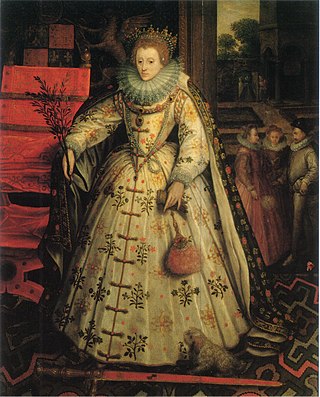
Marcus Gheeraerts the Elder, Marc Gerard and Marcus Garret was a Flemish painter, draughtsman, print designer and etcher who was active in his native Flanders and in England. He practised in many genres, including portraits, religious paintings, landscapes and architectural themes. He designed heraldic designs and decorations for tombs. He is known for his creation of a print depicting a map of his native town Bruges and the illustrations for a Dutch-language publication recounting stories from Aesop's Fables. His attention to naturalistic detail and his practice of drawing animals from life for his prints had an important influence on European book illustration. His son Marcus the Younger became a prominent court painter at the English court.

John Tradescant the Younger, son of John Tradescant the Elder, was a botanist and gardener. The standard author abbreviation Trad. is applied to species he described.

Cornelis de Wael was a Flemish painter, engraver and merchant who was primarily active in Genoa in Italy. He is known for his genre paintings, battle scenes, history paintings and still lifes. Through his art work, support for Flemish painters working in Italy and role as an art dealer, he played an important role in the artistic exchange between Italy and Flanders in the first half of the 17th century. His work also had an influence on local painters such as Alessandro Magnasco, particularly through his scenes of despair and irony.

John de Critz or John Decritz was one of a number of painters of Flemish origin active at the English royal court during the reigns of James I of England and Charles I of England. He held the post of Serjeant Painter to the king from 1603, at first jointly with Leonard Fryer and from 1610 jointly with Robert Peake the Elder.
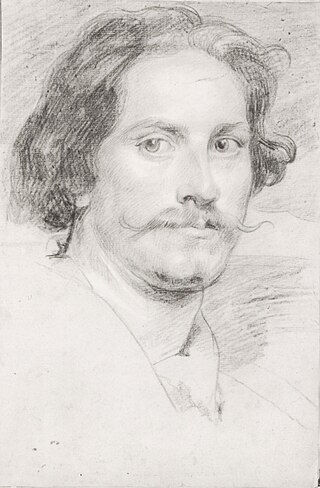
Jan Boeckhorst or Johann Bockhorst was a German-born Flemish Baroque painter and draughtsman who worked most of his career in Antwerp. He was a versatile artist who produced history paintings, genre scenes and portraits in a style influenced by the trio of leading Antwerp painters Peter Paul Rubens, Anthony van Dyck and Jacob Jordaens. Boeckhorst also worked as a designer of cartoons for tapestries.

Osias Beert or Osias Beert the Elder was a Flemish painter active in Antwerp who played an important role in the early development of flower and "breakfast"-type still lifes as independent genres in Northern European art. He has been recognized as one of the most influential artists of the earliest generation of still life painters in Flanders. He contributed in particular to the development of still lifes placed on table tops featuring festive culinary delights as well as of sumptuous floral bouquets, typically displayed in Wan Li vases.

Adriaen or Adriaan van Stalbemt or Adriaen van Stalbempt was a Flemish painter and printmaker who is known for his landscapes with religious, mythological and allegorical scenes. He was also a gifted figure painter who was regularly invited to paint the staffage in compositions of fellow painters.

Marten Pepijn was a Flemish painter who was mainly known for his large-scale history paintings and to a lesser extent for his smaller genre scenes.

Andries van Eertvelt (1590–1652), was a Flemish painter, draughtsman and engraver who was one of the first Flemish artists to specialize in marine art. Several of his pupils also became prominent marine artists.

Hieronymus Galle or Hieronymus Galle I or the Elder was a Flemish painter, who specialized in still lifes of fruit and flowers and hunting pieces. He collaborated with his fellow painters on garland paintings, i.e. paintings showing a garland of flowers or fruit around a devotional image or portrait.
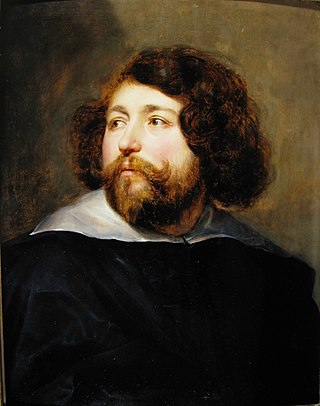
Franciscus de Neve (I) (1606 in Antwerp – 1681 or 1688 in Antwerp or Brussels) was a Flemish painter of history paintings, landscapes and portraits.
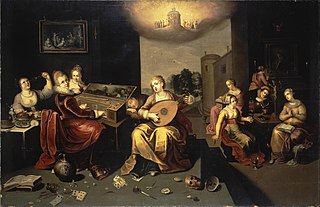
Hieronymus Francken the Younger or Hieronymus II was a Flemish painter and one of the most prominent members of the large Francken family of artists. Along with his brother Frans Francken II he played an important role in the development of new genres in Flemish art in the early 17th century. He was a prolific artist with a wide range who painted religious scenes, allegorical subjects, portraits, fruit pieces, genre scenes, architectural paintings and art galleries.

David Rijckaert II was a Flemish painter and art dealer active in Antwerp. He contributed to the early development of still lifes as an independent genre through his delicate rendering of banquets and sumptuous tabletop still lifes.
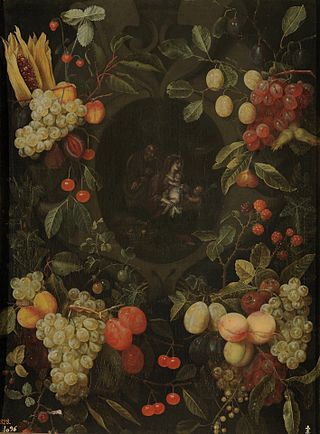
Cornelis van Huynen was a Flemish still life painter who is known for his fruit and garland paintings. He was active in Antwerp where he had trained with the prominent still life painter Joris van Son.

Abraham Vinck or Abraham Willemsz. Vinck was a Flemish painter and art dealer who spent most of his life and career outside of Flanders, including in Hamburg, Naples and Amsterdam. He is mainly known as a portrait painter but also practised in many other genres including history painting, mythological scenes, fruit and fish still lifes and market scenes. He was also a copyist who created copies after the great masters. He is now mainly known for being the co-owner together with his Flemish colleague and business partner Louis Finson of two paintings by Caravaggio.

Emmanuel de Critz was an English painter. He was called the "best portraitist in London" by Robert Walker.